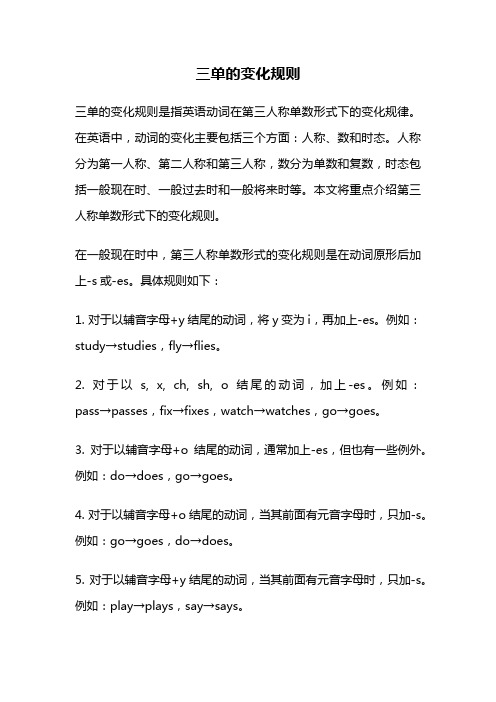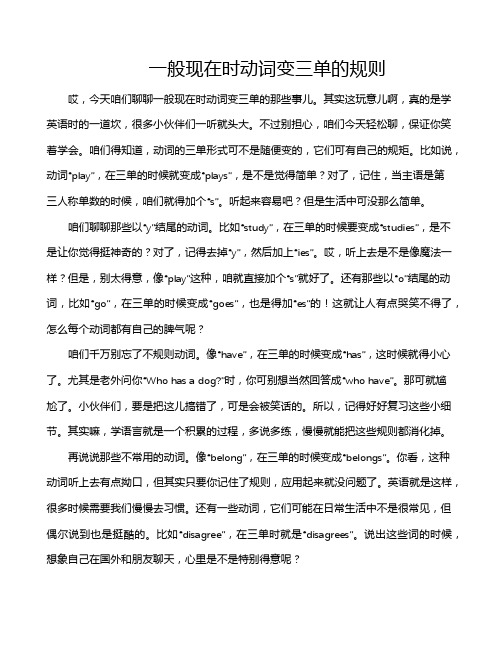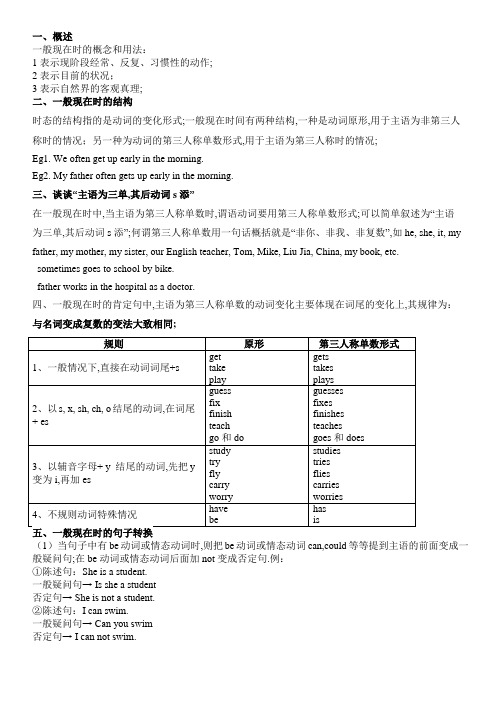一般现在时动词第三人称单数变化规则
动词第三人称单数变化规则

动词第三人称单数变化规则1、一般现在时主语第三人称时的动词变化”-s”①在一般现在时中,当主语为第三人称单数时,动词要用“-s”型(即第三人称单数形式)。
②所谓动词“s”型的构成,可按名词变复数的规则来记,即:•(1)大多数动词直接加__S_ 如:Play-plays,swim-swims.•(2)以_s,x,_ch,_sh,_o_结尾的动词,后面加_es__ 如:watch-watches,wash-washes.go-goes.teach-teaches •(3)以辅音字母加y结尾的变_y__ 为_i__加_es__ 如:study-studies, fly-flies•(4)特殊变化:have - has一.写出下列动词的第三人称单数形式。
read ______go ______stay _____ make _______ brush_______look______have_____ carry___ come______teach_______watch______play_______ fly______study______二、根据所给单词的适当形式填空• 1 He ___ the piano very well. (play)• 2 She ___ got a stamp from Canada .(have)• 3 I ___ housework at home (do)• 4 Eric ___ to school at 6:00 o’clock. (go)• 5 He clothes at home. (wash)• 6 My teacher often ___ TV in the evening. (watch)•7 Daming ___ English well every day.(study)•8 The boys ___ swimming (like)•9 She ____ from America.(come)•10 He ____ like his mother.(look)。
初中一般现在时及三单动词的变化规则

初中一般现在时及三单动词的变化规则
一般现在时的构成:
肯定句:主语+动词原形+其他成分
否定句:主语 + do/does not + 动词原形 + 其他成分
疑问句:(特殊疑问词) + do/does + 主语 + 动词原形 + 其他成分三单动词的变化规则:
一般现在时第三人称单数的动词变化规则是在动词原形末尾加上 -s 或 -es。
大多数动词直接在原形后加-s:
例如:play → plays
study → studies
以 -sh, -ch, -s, -x, -o结尾的动词,在原形后加 -es:
例如:watch → watches
teach → teaches
miss → misses
fix → fixes
do → does
其他一些特殊情况:
以辅音字母+y结尾的动词,将y变为i,再加-es:
例如:fly → flies
study → studies
以元音字母+y结尾的动词,直接加-s:
例如:play → plays
enjoy → enjoys
以-o结尾的动词,大多数加-es:
例如:do → does
go → goes
但也有例外,像是have、go这些常用的动词变化为has和goes。
需要注意的是,不可数名词和第三人称单数主语时,一般现在时动词不变化,依然使用动词原形:
例如:Water boils at 100 degrees Celsius.
She sings beautifully.。
英语第三人称单数的规则

英语第三人称单数的规则英语中第三人称单数指的是指代“他/她/它”的情况。
在单数形式下,我们需要用不同的动词形式来描述不同的动作。
以下是英语中第三人称单数的规则:一、在一般现在时中,第三人称单数动词的规则1. 动词以“s”结尾,如likes, runs, eats等。
2. 如果动词以“o, s, x, ch, sh”结尾,则在词尾加“es”,如goes, watches, fixes, brushes, washes等。
3. 对于以“y”结尾的动词,先将“y”改为“i”,再加“es”,如studies, flies, tries等。
4. 对于一些不规则动词,要特别注意其第三人称单数形式,如has, does, goes等。
二、在一般过去时中,第三人称单数动词的规则1. 相较于一般现在时,第三人称单数动词的规则更加简单,直接在动词后面加上“ed”即可,如loved, played, worked等。
2. 对于一些不规则动词,比如saw, gave, went等,要特别注意它们的过去式和过去分词。
三、在现在进行时中,第三人称单数动词的规则1. 在动词后面加上“ing”,如is running, is eating, is sleeping等。
2. 对于以“e”结尾的动词,在加“ing”的同时去掉“e”,如making, taking, writing等。
3. 如果一个动词包含一个元音字母和一个辅音字母,则要将这个辅音字母加倍,再加上“ing”,如running, swimming, sitting。
四、在被动语态中,第三人称单数动词的规则1. 在动词后面加上“is/am/are+过去分词”,如is played, is eaten, is loved 等。
2. 对于一些不规则动词,比如seen, given, gone等,要特别注意其被动语态形式。
以上就是英语中第三人称单数的规则,掌握这些规则能够帮助你更好地理解和运用英语语法。
一般现在时动词第三人称单数变化规则

一.概述一般如今时的概念和用法:(1)暗示现阶段经常.重复.习惯性的动作;(2)暗示今朝的状态;(3)暗示天然界的客不雅真谛.二.一般如今时的构造时态的构造指的是动词的变更情势.一般如今时光有两种构造,一种是动词本相,用于主语为非第三人称时的情形;另一种为动词的第三人称单数情势,用于主语为第三人称时的情形.Eg1.We often get up early in the morning.Eg2.My father often gets up early in the morning.三.谈谈“主语为三单,厥后动词s添”在一般如今时中,当主语为第三人称单数时,谓语动词要用第三人称单数情势.可以简略论述为“主语为三单,厥后动词s添”.何谓第三人称单数?用一句话归纳综合就是“非你.非我.非复数”,如he, she, it, my father, my mother, my sister, ourEnglish teacher, Tom, Mike, Liu Jia, China, my book, etc.Eg3.He sometimes goes to school by bike.Eg4.My father works in the hospital asa doctor.四、一般如今时的确定句中,主语为第三人称单数的动词变更重要表如今词尾的变更上,其纪律为:(与名词变成复数的变法大致雷同.)五.一般如今时的句子转换(1)当句子中有be动词或情态动词时,则把be动词或情态动词(can,could等等)提到主语的前面变成一般疑问句;在be动词或情态动词后面加not变成否认句.例:①陈述句:She is a student.一般疑问句→ Is she a student?否认句→ She is not a student.②陈述句:I can swim.一般疑问句→ Can you swim否认句→ I can not swim.(2)当句子中即没有be动词,也没有情态动词时,则在主语前加助动词do (you,以及复数), does(单数she,he,it)变成一般疑问句;在主语后谓语动词前加助动词don’t(I,you,以及复数), doesn’t(单数she,he,it)变成否认句,助动词后的动词要变成动词本相.例:①陈述句:We get up at 7:00 every morning.一般疑问句→Do you get up at 7:00 every morning?否认句→We don’t get up at 7:00 every morning.②陈述句:She has a little brother.一般疑问句→ Does she have a little brother?否认句→ She doesn’t have a little brother.哪些主语是第三人称单数?1、人称代词he, she, it;如:He likes watching TV. 他爱好看电视.She has lunch at twelve. 她十二点吃午餐.It looks like a cat. 它看起来像只猫.2.单小我名.地名或称呼作主语;是第三人称单数.如:Han Mei looks like her mother. 韩梅看起来像她的母亲.Beijing is in China. 北京在中国.Uncle Wang often makes cakes. 王叔叔经常做蛋糕.3.单数可数名词或this / that / the + 单数可数名词作主语时,是第三人称单数;A horse is a useful animal. 马是有效的动物.This book is yours. 这本书是你的.That car is red. 那辆小汽车是红色的.The cat is Lucy's. 只猫是露茜的.4.不成数名词作主语时为第三人称单数.如:The milk is in the glass.牛奶在玻璃杯里.The bread is very small. 那面包很小.The water is very cold. 那些水很凉.1.写出下列动词的第三人称单数.drink ________ go _______ stay ________ make ________ look_________have_______ pass_______ carry _______ come________watch________plant_______ fly ________ study_______ brush________teach________catch_________ wash___________do________ like________ say_______ learn ___________eat___________ read___________ sing___________buy__________study_______ come__________plant(栽种)______2.用括号内动词的恰当情势填空.1. He often ________(have) dinner at home.2. We _____________ (not watch) TV on Monday.3. Nick ___________ (not go) to the zoo on Sunday.4. ________ they __________ (like) the World Cup?5. What _________they often _________ (do) on Saturdays?6. _________ your parents _________ (read) newspapers every day?7. There ________(be) some water in the bottle.8. My aunt _______(look) after her baby carefully.9. The child often _______(watch) TV in the evening.10. Mike’s sister ________ (cook) nice food. I _______ (like) eatingit very much.11. _______ (do) your brother_______ (watch) TV in the evening? No,he_______ (not).12. We often___________(play) in the playground.13. He _________(get) up at six o’clock.14.__________you_________(brush) your teeth every morning.15. What________ (do) he usually______ (do) after school?16.Danny_______(study)English,Chinese,Maths,Science and Art at school.17. Mike sometimes __________(go) to the park with his sister.18. At eight at night, she often__________(watch) TV with his parents.19. ________ Mike________(read) English every day?20.How many lessons_________your classmate________(have) on Monday?21. What time_________his mother_________(do) the housework?1.We _____________ ( go ) to school on foot every day .2.They ______________( not have ) any lessons on Sundays .3.She _____________ ( brush ) her teeth twice a day .4.These students ____________ ( be not ) good at boating .5.Wei Hua always ____________( carry ) water for his grandpa on Sundays .6.___________Kate ____________( like ) making friends ?7.The lazy boy ______________( not do ) his homework in the evening .8.How many classes _________you __________( have ) every day?9.Who __________the baby ___________( look ) like ?10.He can ___________( teach ) us Enlgish well .11. He often ________(have) dinner at home.12. Daniel and Tommy _______(be) in Class One.13. Nick _________(not go) to the zoo on Sunday.14. What _______they often _______(do) on Saturdays?15. _______ your parents _______(read) newspapers every day?16. The girl ____________(teach) us English on Sundays.17. She and I ________(take) a walk together every evening.18. There ________(be) some water in the bottle.19. They _______(have) the same hobby.20. My aunt __________(look) after her baby carefully.21. You always _______(do) your homework well.22. I _______(be) ill. I’m staying in bed.23. She _______(go) to school from Monday to Friday.24. The child often ____________(watch) TV in the evening.25.What day _______(be) it today? -It’s Saturday.26. He _________ (get) up at six o'clock.( )1. I ________to school at 7:00 in the morning.A. goB. goingC. goes( )2. They _______books every day in the library.A.readsB. readC. reading( )3. The monkey________ eating bananas very much.A.likeB. likesC. liking( )4. My father ________to read newspaper after supper every day. A.like B. likes C. liking( )5. I like watching TV, but my mother _________like it.A. d on’tB. doesn’tC. does( )6. ____________ your father drink milk every day?A.doB. areC. does( )7. We will go shopping if it____ tomorrow.A.don't rainB. didn't rainC.doesn't rainD. isn't rain( )8. He said the sun ____in the east and ____in the west.A rose; setB rises; setsC rises, setD rise; sets( )9.Wang Mei ____ music and often ____ to music.A like; listenB likes; listensC like; are listeningD liking ; listen( )10. Jenny____ English every evening.A has studyB studiesC studyD studied3.选出准确的答案:1. She (like / likes) to play football.2. He (like / likes) drinking milk.3. I (like / likes) to watch TV.4. We (like / likes) to play badminton.5. They (like / likes) to sing songs.6. She (read / reads) books every day.7. He (play / plays) computer games every day.8. It (listen / listens) to the radio every day.9. Linda (draw / draws) pictures every day.10. Jane and Linda (play / plays) football every day.5.把下列句子变成否认句:1. We like playing football.2. Linda swims every day.3. They like playing games.4. My father reads newspaper in the evening.7.把下列句子变成疑问句,并做确定和否认答复.1. My brother can ride a horse.2. We clean the classroom after school.___________________________________________________________。
三单的变化规则

三单的变化规则三单的变化规则是指英语动词在第三人称单数形式下的变化规律。
在英语中,动词的变化主要包括三个方面:人称、数和时态。
人称分为第一人称、第二人称和第三人称,数分为单数和复数,时态包括一般现在时、一般过去时和一般将来时等。
本文将重点介绍第三人称单数形式下的变化规则。
在一般现在时中,第三人称单数形式的变化规则是在动词原形后加上-s或-es。
具体规则如下:1. 对于以辅音字母+y结尾的动词,将y变为i,再加上-es。
例如:study→studies,fly→flies。
2. 对于以s, x, ch, sh, o结尾的动词,加上-es。
例如:pass→passes,fix→fixes,watch→watches,go→goes。
3. 对于以辅音字母+o结尾的动词,通常加上-es,但也有一些例外。
例如:do→does,go→goes。
4. 对于以辅音字母+o结尾的动词,当其前面有元音字母时,只加-s。
例如:go→goes,do→does。
5. 对于以辅音字母+y结尾的动词,当其前面有元音字母时,只加-s。
例如:play→plays,say→says。
6. 对于以辅音字母+ch, sh, x结尾的动词,当其前面有元音字母时,只加-s。
例如:teach→teaches,wash→washes。
在一般过去时中,第三人称单数形式的变化规则是在动词原形后加上-ed或-d。
具体规则如下:1. 对于以辅音字母+e结尾的动词,直接加上-d。
例如:live→lived,hope→hoped。
2. 对于以重读闭音节结尾的动词,双写最后一个辅音字母,再加上-ed。
例如:stop→stopped,plan→planned。
3. 对于以辅音字母+y结尾的动词,将y变为i,再加上-ed。
例如:study→studied,carry→carried。
4. 对于以辅音字母结尾的动词,当其前面是元音字母时,双写最后一个辅音字母,再加上-ed。
一般现在时动词变三单的规则

一般现在时动词变三单的规则哎,今天咱们聊聊一般现在时动词变三单的那些事儿。
其实这玩意儿啊,真的是学英语时的一道坎,很多小伙伴们一听就头大。
不过别担心,咱们今天轻松聊,保证你笑着学会。
咱们得知道,动词的三单形式可不是随便变的,它们可有自己的规矩。
比如说,动词“play”,在三单的时候就变成“plays”,是不是觉得简单?对了,记住,当主语是第三人称单数的时候,咱们就得加个“s”。
听起来容易吧?但是生活中可没那么简单。
咱们聊聊那些以“y”结尾的动词。
比如“study”,在三单的时候要变成“studies”,是不是让你觉得挺神奇的?对了,记得去掉“y”,然后加上“ies”。
哎,听上去是不是像魔法一样?但是,别太得意,像“play”这种,咱就直接加个“s”就好了。
还有那些以“o”结尾的动词,比如“go”,在三单的时候变成“goes”,也是得加“es”的!这就让人有点哭笑不得了,怎么每个动词都有自己的脾气呢?咱们千万别忘了不规则动词。
像“have”,在三单的时候变成“has”,这时候就得小心了。
尤其是老外问你“Who has a dog?”时,你可别想当然回答成“who have”。
那可就尴尬了。
小伙伴们,要是把这儿搞错了,可是会被笑话的。
所以,记得好好复习这些小细节。
其实嘛,学语言就是一个积累的过程,多说多练,慢慢就能把这些规则都消化掉。
再说说那些不常用的动词。
像“belong”,在三单的时候变成“belongs”。
你看,这种动词听上去有点拗口,但其实只要你记住了规则,应用起来就没问题了。
英语就是这样,很多时候需要我们慢慢去习惯。
还有一些动词,它们可能在日常生活中不是很常见,但偶尔说到也是挺酷的。
比如“disagree”,在三单时就是“disagrees”。
说出这些词的时候,想象自己在国外和朋友聊天,心里是不是特别得意呢?讲到这里,咱们不能忘了动词的发音。
有些动词在变三单的时候,发音也会有些变化。
比如“catch”,在三单的时候是“catches”,这个时候的“e”就要轻轻地发出来。
一般现在时动词第三人称单数变化规则

一、概述一般现在时的概念和用法:1表示现阶段经常、反复、习惯性的动作;2表示目前的状况;3表示自然界的客观真理;二、一般现在时的结构时态的结构指的是动词的变化形式;一般现在时间有两种结构,一种是动词原形,用于主语为非第三人称时的情况;另一种为动词的第三人称单数形式,用于主语为第三人称时的情况;Eg1. We often get up early in the morning.Eg2. My father often gets up early in the morning.三、谈谈“主语为三单,其后动词s添”在一般现在时中,当主语为第三人称单数时,谓语动词要用第三人称单数形式;可以简单叙述为“主语为三单,其后动词s添”;何谓第三人称单数用一句话概括就是“非你、非我、非复数”,如he, she, it, my father, my mother, my sister, our English teacher, Tom, Mike, Liu Jia, China, my book, etc.sometimes goes to school by bike.father works in the hospital as a doctor.四、一般现在时的肯定句中,主语为第三人称单数的动词变化主要体现在词尾的变化上,其规律为:与名词变成复数的变法大致相同;(2)当句子中即没有be动词,也没有情态动词时,则在主语前加助动词do you,以及复数, does单数she,he,it变成一般疑问句;在主语后谓语动词前加助动词don’tI,you,以及复数, doesn’t单数she,he,it变成否定句,助动词后的动词要变成动词原形;例:①陈述句:We get up at 7:00 every morning.一般疑问句→Do you get up at 7:00 every morning否定句→We don’t get up at 7:00 every morning.②陈述句:She has a little brother.一般疑问句→ Does she have a little brother否定句→ She doesn’t have a little brother.哪些主语是第三人称单数1、人称代词he, she, it;如:He likes watching TV. 他喜欢看电视;She has lunch at twelve. 她十二点吃午餐;It looks like a cat. 它看起来像只猫;2、单个人名、地名或称呼作主语;是第三人称单数;如:Han Mei looks like her mother. 韩梅看起来像她的母亲;Beijing is in China. 北京在中国;Uncle Wang often makes cakes. 王叔叔经常做蛋糕;3、单数可数名词或this / that / the + 单数可数名词作主语时,是第三人称单数;A horse is a useful animal. 马是有用的动物;This book is yours. 这本书是你的;That car is red. 那辆小汽车是红色的;The cat is Lucy's. 只猫是露茜的;4、不可数名词作主语时为第三人称单数;如:The milk is in the glass.牛奶在玻璃杯里;The bread is very small. 那面包很小;The water is very cold. 那些水很凉;1、写出下列动词的第三人称单数;drink ________ go _______ stay ________ make ________ look _________have_______ pass_______ carry _______ come________ watch________plant_______ fly ________ study_______ brush________ teach________catch_________ wash___________do________ like________ say_______learn ___________eat___________ read___________ sing___________ buy__________study_______ come__________plant种植______2、用括号内动词的适当形式填空;1. He often ________have dinner at home.2. We _____________ not watch TV on Monday.3. Nick ___________ not go to the zoo on Sunday.4. ________ they __________ like the World Cup5. What _________they often _________ do on Saturdays6. _________ your parents _________ read newspapers every day7. There ________be some water in the bottle.8. My aunt _______look after her baby carefully.9. The child often _______watch TV in the evening.10. Mike’s sister ________ cook nice food. I _______ like eating it very much.11. _______ do your brother_______ watch TV in the evening No, he_______ not.12. We often___________play in the playground.13. He _________get up at six o’clock.brush your teeth every morning.15. What________ do he usually______ do after school studyEnglish,Chinese,Maths,Science and Art at school.17. Mike sometimes __________go to the park with his sister.18. At eight at night, she often__________watch TV with his parents.19. ________ Mike________read English every daymany lessons_________your classmate________have on Monday 21. What time_________his mother_________do the housework_____________ go to school on foot every day .______________ not have any lessons on Sundays ._____________ brush her teeth twice a day .students ____________ be not good at boating .Hua always ____________ carry water for his grandpa on Sundays . ____________ like making friendslazy boy ______________ not do his homework in the evening . many classes _________you __________ have every day__________the baby ___________ look likecan ___________ teach us Enlgish well .11. He often ________have dinner at home.12. Daniel and Tommy _______be in Class One.13. Nick _________not go to the zoo on Sunday.14. What _______they often _______do on Saturdays15. _______ your parents _______read newspapers every day16. The girl ____________teach us English on Sundays.17. She and I ________take a walk together every evening.18. There ________be some water in the bottle.19. They _______have the same hobby.20. My aunt __________look after her baby carefully.21. You always _______do your homework well.22. I _______be ill. I’m staying in bed.23. She _______go to school from Monday to Friday.24. The child often ____________watch TV in the evening.day _______be it today -It’s Saturday.26. He _________ get up at six o'clock.1. I ________to school at 7:00 in the morning.A. goB. goingC. goes2. They _______books every day in the library.B. readC. reading3. The monkey________ eating bananas very much.B. likesC. liking4. My father ________to read newspaper after supper every day.B. likesC. liking5. I like watching TV, but my mother _________like it.A. don’tB. doesn’tC. does6. ____________ your father drink milk every dayB. areC. does7. We will go shopping if it____ tomorrow.'t rain B. didn't rain 't rain D. isn't rain8. He said the sun ____in the east and ____in the west.A rose; setB rises; setsC rises, setD rise; setsMei ____ music and often ____ to music.A like; listenB likes; listensC like; are listeningD liking ; listen10. Jenny____ English every evening.A has studyB studiesC studyD studied3、选出正确的答案:1. She like / likes to play football.2. He like / likes drinking milk.3. I like / likes to watch TV.4. We like / likes to play badminton.5. They like / likes to sing songs.6. She read / reads books every day.7. He play / plays computer games every day.8. It listen / listens to the radio every day.9. Linda draw / draws pictures every day.10. Jane and Linda play / plays football every day.5、把下列句子变为否定句:1. We like playing football.2. Linda swims every day.3. They like playing games.4. My father reads newspaper in the evening.7、把下列句子变为疑问句,并做肯定和否定回答;1. My brother can ride a horse.2. We clean the classroom after school.___________________________________________________________。
第三人称单数变化规则

- 1、下载文档前请自行甄别文档内容的完整性,平台不提供额外的编辑、内容补充、找答案等附加服务。
- 2、"仅部分预览"的文档,不可在线预览部分如存在完整性等问题,可反馈申请退款(可完整预览的文档不适用该条件!)。
- 3、如文档侵犯您的权益,请联系客服反馈,我们会尽快为您处理(人工客服工作时间:9:00-18:30)。
一、概述一般现在时的概念和用法:(1)表示现阶段经常、反复、习惯性的动作;(2)表示目前的状况;(3)表示自然界的客观真理。
二、一般现在时的结构时态的结构指的是动词的变化形式。
一般现在时间有两种结构,一种是动词原形,用于主语为非第三人称时的情况;另一种为动词的第三人称单数形式,用于主语为第三人称时的情况。
Eg1. We often get up early in the morning.Eg2. My father often gets up early in the morning.三、谈谈“主语为三单,其后动词s添”在一般现在时中,当主语为第三人称单数时,谓语动词要用第三人称单数形式。
可以简单叙述为“主语为三单,其后动词s添”。
何谓第三人称单数?用一句话概括就是“非你、非我、非复数”,如he, she, it, my father, my mother, my sister, our English teacher, Tom, Mike, Liu Jia, China, my book, etc.Eg3.He sometimes goes to school by bike.Eg4.My father works in the hospital as a doctor.四、一般现在时的肯定句中,主语为第三人称单数的动词变化主要体现在词尾的变化上,其规律为:(与名词变成复数的变法大致相同。
)五、一般现在时的句子转换(1)当句子中有be动词或情态动词时,则把be动词或情态动词(can,could等等)提到主语的前面变成一般疑问句;在be动词或情态动词后面加not变成否定句.例:①陈述句:She is a student.一般疑问句→ Is she a student?否定句→ She is not a student.②陈述句:I can swim.一般疑问句→ Can you swim否定句→ I can not swim.(2)当句子中即没有be动词,也没有情态动词时,则在主语前加助动词do (you,以及复数), does(单数she,he,it)变成一般疑问句;在主语后谓语动词前加助动词don’t(I,you,以及复数), doesn’t(单数she,he,it)变成否定句,助动词后的动词要变成动词原形。
例:①陈述句:We get up at 7:00 every morning.一般疑问句→Do you get up at 7:00 every morning?否定句→We don’t get up at 7:00 every morning.②陈述句:She has a little brother.一般疑问句→ Does she have a little brother?否定句→ She doesn’t have a little brother.哪些主语是第三人称单数?1、人称代词he, she, it;如:He likes watching TV. 他喜欢看电视。
She has lunch at twelve. 她十二点吃午餐。
It looks like a cat. 它看起来像只猫。
2、单个人名、地名或称呼作主语;是第三人称单数。
如:Han Mei looks like her mother. 韩梅看起来像她的母亲。
Beijing is in China. 北京在中国。
Uncle Wang often makes cakes. 王叔叔经常做蛋糕。
3、单数可数名词或this / that / the + 单数可数名词作主语时,是第三人称单数;A horse is a useful animal. 马是有用的动物。
This book is yours. 这本书是你的。
That car is red. 那辆小汽车是红色的。
The cat is Lucy's. 只猫是露茜的。
4、不可数名词作主语时为第三人称单数。
如:The milk is in the glass.牛奶在玻璃杯里。
The bread is very small. 那面包很小。
The water is very cold. 那些水很凉。
1、写出下列动词的第三人称单数。
drink ________ go _______ stay ________ make ________ look _________have_______ pass_______ carry _______ come________ watch________plant_______ fly ________ study_______ brush________ teach________catch_________ wash___________do________ like________ say_______learn ___________eat___________ read___________ sing___________ buy__________study_______ come__________plant(种植)______2、用括号内动词的适当形式填空。
1. He often ________(have) dinner at home.2. We _____________ (not watch) TV on Monday.3. Nick ___________ (not go) to the zoo on Sunday.4. ________ they __________ (like) the World Cup?5. What _________they often _________ (do) on Saturdays?6. _________ your parents _________ (read) newspapers every day?7. There ________(be) some water in the bottle.8. My aunt _______(look) after her baby carefully.9. The child often _______(watch) TV in the evening.10. Mike’s sister ________ (cook) nice food. I _______ (lik e) eating it very much.11. _______ (do) your brother_______ (watch) TV in the evening? No, he_______ (not).12. We often___________(play) in the playground.13. He _________(get) up at six o’clock.14.__________you_________(brush) your teeth every morning.15. What________ (do) he usually______ (do) after school?16.Danny_______(study)English,Chinese,Maths,Science and Art at school.17. Mike sometimes __________(go) to the park with his sister.18. At eight at night, she often__________(watch) TV with his parents.19. ________ Mike________(read) English every day?20.How many lessons_________your classmate________(have) on Monday?21. What time_________his mother_________(do) the housework?1.We _____________ ( go ) to school on foot every day .2.They ______________( not have ) any lessons on Sundays .3.She _____________ ( brush ) her teeth twice a day .4.These students ____________ ( be not ) good at boating .5.Wei Hua always ____________( carry ) water for his grandpa on Sundays .6.___________Kate ____________( like ) making friends ?7.The lazy boy ______________( not do ) his homework in the evening .8.How many classes _________you __________( have ) every day?9.Who __________the baby ___________( look ) like ?10.He can ___________( teach ) us Enlgish well .11. He often ________(have) dinner at home.12. Daniel and Tommy _______(be) in Class One.13. Nick _________(not go) to the zoo on Sunday.14. What _______they often _______(do) on Saturdays?15. _______ your parents _______(read) newspapers every day?16. The girl ____________(teach) us English on Sundays.17. She and I ________(take) a walk together every evening.18. There ________(be) some water in the bottle.19. They _______(have) the same hobby.20. My aunt __________(look) after her baby carefully.21. You always _______(do) your homework well.22. I _______(be) ill. I’m staying in bed.23. She _______(go) to school from Monday to Friday.24. The child often ____________(watch) TV in the evening.25.-What day _______(be) it today? -It’s Saturday.26. He _________ (get) up at six o'clock.( )1. I ________to school at 7:00 in the morning.A. goB. goingC. goes( )2. They _______books every day in the library.A.readsB. readC. reading( )3. The monkey________ eating bananas very much.A.likeB. likesC. liking( )4. My father ________to read newspaper after supper every day.A.likeB. likesC. liking( )5. I like watching TV, but my mother _________like it.A. don’tB. doesn’tC. does( )6. ____________ your father drink milk every day?A.doB. areC. does( )7. We will go shopping if it____ tomorrow.A.don't rainB. didn't rainC.doesn't rainD. isn't rain ( )8. He said the sun ____in the east and ____in the west.A rose; setB rises; setsC rises, setD rise; sets ( )9.Wang Mei ____ music and often ____ to music.A like; listenB likes; listensC like; are listeningD liking ; listen ( )10. Jenny____ English every evening.A has studyB studiesC studyD studied3、选出正确的答案:1. She (like / likes) to play football.2. He (like / likes) drinking milk.3. I (like / likes) to watch TV.4. We (like / likes) to play badminton.5. They (like / likes) to sing songs.6. She (read / reads) books every day.7. He (play / plays) computer games every day.8. It (listen / listens) to the radio every day.9. Linda (draw / draws) pictures every day.10. Jane and Linda (play / plays) football every day.5、把下列句子变为否定句:1. We like playing football.2. Linda swims every day.3. They like playing games.4. My father reads newspaper in the evening.7、把下列句子变为疑问句,并做肯定和否定回答。
